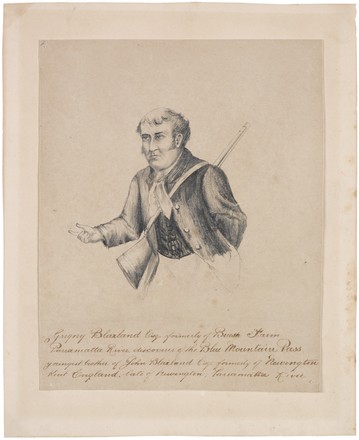Gregory Blaxland
1807–20
ML 143
Pencil drawing
Following the advice of family friend Sir Joseph Banks, English farmer and explorer Gregory Blaxland (1778 – 1853) and his brother John Blaxland (1769-1845) emigrated to Australia with their families in 1806. As one of the first wealthy and educated family's to settle in New South Wales, the government promised them a generous grant of land, convict slaves and free passage.
Soon after their arrival in the colony, Gregory became notorious for his demanding nature and sense of entitlement. His commercial interests and frequent requests for more land brought him into opposition with authority, particularly with Governor William Bligh, who openly criticised his business activities and demands upon government assistance.
During his time in Australia, Gregory Blaxland was considered an ambitious, self-interested man, with a streak of discontent. Towards the end of his life, he suffered a series of losses, both personal and economic, and fell into depression. He committed suicide on January 1st 1853.
Blaxland of Brush Farm
One of Gregory Blaxland’s many landholdings was an estate of 450 acres
of land he purchased from landowner
and public servant, D’Arcy Wentworth soon after his arrival in 1806. The area (in present
day Eastwood) was called the ‘Brush Farm.’ Blaxland developed the estate over
many years, along with other large pastoral holdings and stockyards across
Sydney. He settled permanently on Brush Farm in 1820 after the loss of most of
his grazing flocks due to drought and economic downturn. Blaxland turned to
agricultural experimentation on the Brush Farm estate, determined to make new
crops pay. His experiments with tobacco and hops failed, but other crops
flourished. He was the first in Australia to successfully cultivate buffalo
grass for fodder. He was also very successful in producing wine. Although
Blaxland wasn’t the first to plant a vineyard, he was the first to successfully
export Australian wine (probably a form of burgundy or claret) to London, where
it was awarded a silver medal.
Blaxland had always been known as a melancholy type, but his later years
were marked by real tragedy. His baby son, Christopher, died at the age of
three months in 1822. His wife, Elizabeth, followed after a long illness in
1826. Blaxland was forced to sell Brush Farm in 1831, after having built it up
over 25 years, in order to settle outstanding debts. His brother, John, died in
1845 and his adult sons, George and Gregory also suffered untimely deaths in a
buggy accident in 1849 and a spearing by Aborigines in 1850 respectively.
Gregory suffered increasing bouts of depression and delirium and ultimately
committed suicide at Parramatta on January 1, 1853.



 Back to list
Back to list